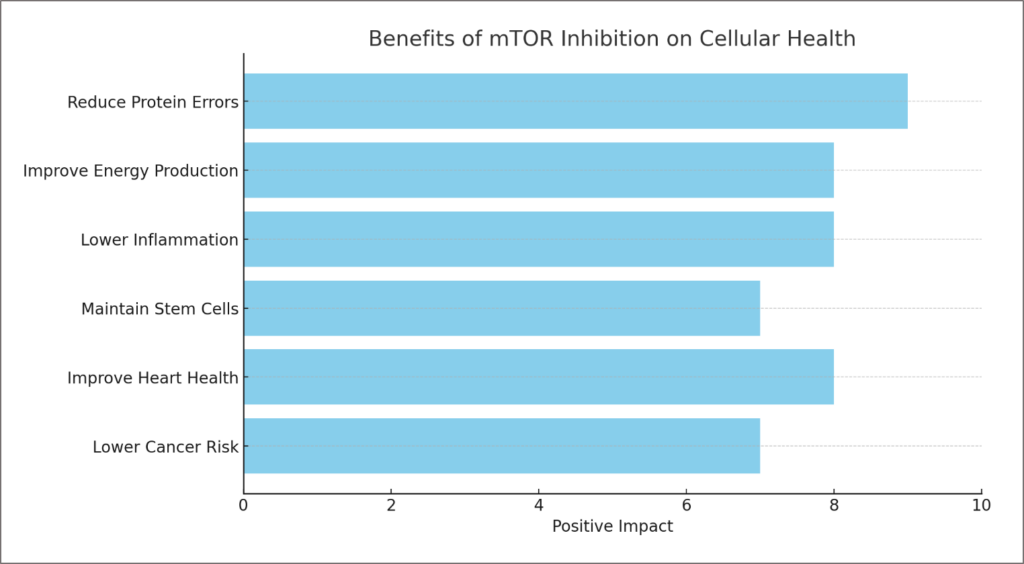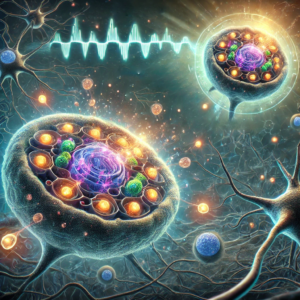Turning Back Time: Rapamycin and mTOR May Prevent Age-Related Disease Risks

Aging is like a slow clock ticking down inside your cells. Scientists think that rapamycin and a protein called mTOR may be able to slow this clock and prevent age-related disease progression.
- Controlling the mTOR protein with rapamycin (Rapa) might expand lifespan and prevent age-related disease risk, suggests research.
- mTOR supports cell growth and affects how we age and when we might get sick.
- mTOR controls how cells make proteins, use energy, handle irritation (inflammation), and repair themselves when damaged.
- Targeting mTOR could help manage aging by improving healthspan and longevity
Getting Older: The Cellular Link to Disease
Aging is a complex and inevitable part of life. As we grow older, the cells inside our bodies don’t work quite as well as they used to. This makes us more vulnerable to getting certain diseases. A protein called mTOR is a central player in this process. It works by controlling the way eukaryotic cells grow, use energy, and even how long they live. Think of eukaryotic cells as the building blocks of your body.
This table summarizes why healthy eukaryotic cells are so critical for healthspan:
| Importance | Explanation |
|---|---|
| Workhorses Inside the Body | Build muscles and organs, power your body, fight off germs, and clean up waste. |
| Efficient Function, Healthy You | Keep your body running smooth, delaying sickness. |
| Healthy Cells, Healthy Replication | Healthy cells = constant upgrades! They can copy themselves efficiently, keeping your organs in top shape with a steady supply of fresh cells for repairs. |
| Defense System | Your body’s defense system (immune cells) needs healthy building blocks (eukaryotic cells) to fight off germs and stay strong. This keeps you healthy longer. |
About this mTOR and Aging Study
This 2019 study by Italian researchers looked at how mTOR affects aging and disease. They saw that restraining mTOR may help people live longer and delay or prevent age-related disease. Some of those include cancer, heart disease, and various brain disorders. It’s important to remember that any treatment targeting mTOR might also have downsides. Because of this, more research is needed before drawing any firm conclusions. Even so, everything found thus far looks highly promising.
Rapamycin Meets mTOR
Rapamycin (Rapa) is a drug that’s creating a lot of buzz among anti-aging experts. Advocates for this unique compound believe it could put the brakes on human aging. It works by slowing down the mTOR protein, which controls cell growth and repair. Whenever mTOR becomes too active, we age faster and become more vulnerable to sicknesses. Rapamycin’s secret is the unique way it keeps mTOR in check.
Building Blocks and Aging Bodies
mTORC1 is one of the mTOR complexes (groups of proteins). It controls how your cells build molecules and grow. Remember, proteins in the body are like tiny building blocks. Scientists are looking at ways to slow down an overly active mTORC1. Slower protein building could reduce errors and stop damaged proteins from piling up. The idea is that influencing mTORC1 may extend life span and prevent age-related disease threats.
Cell Power and the Aging Puzzle
In every cell is a tiny power plant called mitochondria. The protein mTOR helps build more of these when needed, and it keeps them working hard to make energy. That’s great, but this natural process can backfire when there is too much mTOR activity. An overly active mTOR can stress out the mitochondria, leading to damage known as oxidative stress. This type of harm can contribute to aging and heart problems (cardiovascular diseases).

Inflammation and Fighting Off Sickness

One of the unfortunate sides of aging is that our bodies can get stuck in a low-grade inflammatory state. This, along with mTOR activity, can make it harder to fight off germs. However, the potential of controlling mTOR is inspiring. mTOR helps control how the body releases chemicals that cause swelling and affects the way immune cells work. Researchers believe that regulating mTOR offers a likely solution.
If this and other studies prove this approach, we can expect two things: less inflammation and a stronger immune system. This would help significantly prevent age-related disease risks. The upshot would be improvements to overall health span and longevity.
Stem Cells, Repair, and Living Longer
The human body uses special cells called stem cells to repair tissues. The protein mTOR helps cells multiply and fix damage as it happens. But too much mTOR action is a bad thing and can actually hurt those stem cells. Also, mTOR stops a process called “autophagy,” where cells clean up junk (old or damaged bits). So, studies hope to confirm that controlling mTOR keeps stem cells healthy and boosts autophagy. To put it another way, help cells work better to slow down aging.
The mTOR Effect on Heart Health
Another problem caused by overactive mTOR is that it can mess with cardiovascular (heart) health. When too active, it makes arteries less flexible and raises blood pressure. There is also an increased risk of clogged arteries (blood vessels). Again, scientists believe that finding safe ways to control mTOR is the answer. Imagine that! A rapamycin treatment to keep hearts working smoothly, lowering the chances of heart disease.

Protein Growth, Cancer, and Rapamycin
The more active mTOR is, the faster cancer cells multiply, and that’s a big problem for sufferers. Rapamycin-controlled mTOR may be able to slow down rapid tumor growth. This would be a massive win for cancer treatments everywhere. For now, though, scientists are still trying to figure out the optimal Rapa doses to avoid side effects.
This chart summarizes the positive effects discussed in the above sections. The scale along the bottom ranges from 0–10. The higher the number, the greater the positive impact.

The inhibition of mTOR presents a promising strategy for extending lifespan and combating age-related diseases. However, the dual nature of mTOR’s role in cellular metabolism necessitates a balanced approach to leverage its benefits while minimizing adverse effects. Ongoing research aims to refine mTOR-targeted therapies, offering hope for healthier aging and improved disease management.
In Closing: What it All Means
Experiments on rapamycin for controlling mTOR are promising in aging and disease studies. Scientists remain enthusiastic about how Rapa treatments may control this important molecule. These findings could lead to therapies that delay or prevent age-related disease risks. If such treatments get to market, we could see a significant boost to healthspan and subsequent lifespan. The tricky part for now is that mTOR does good and bad things in cells, so finding the right balance is vital.




